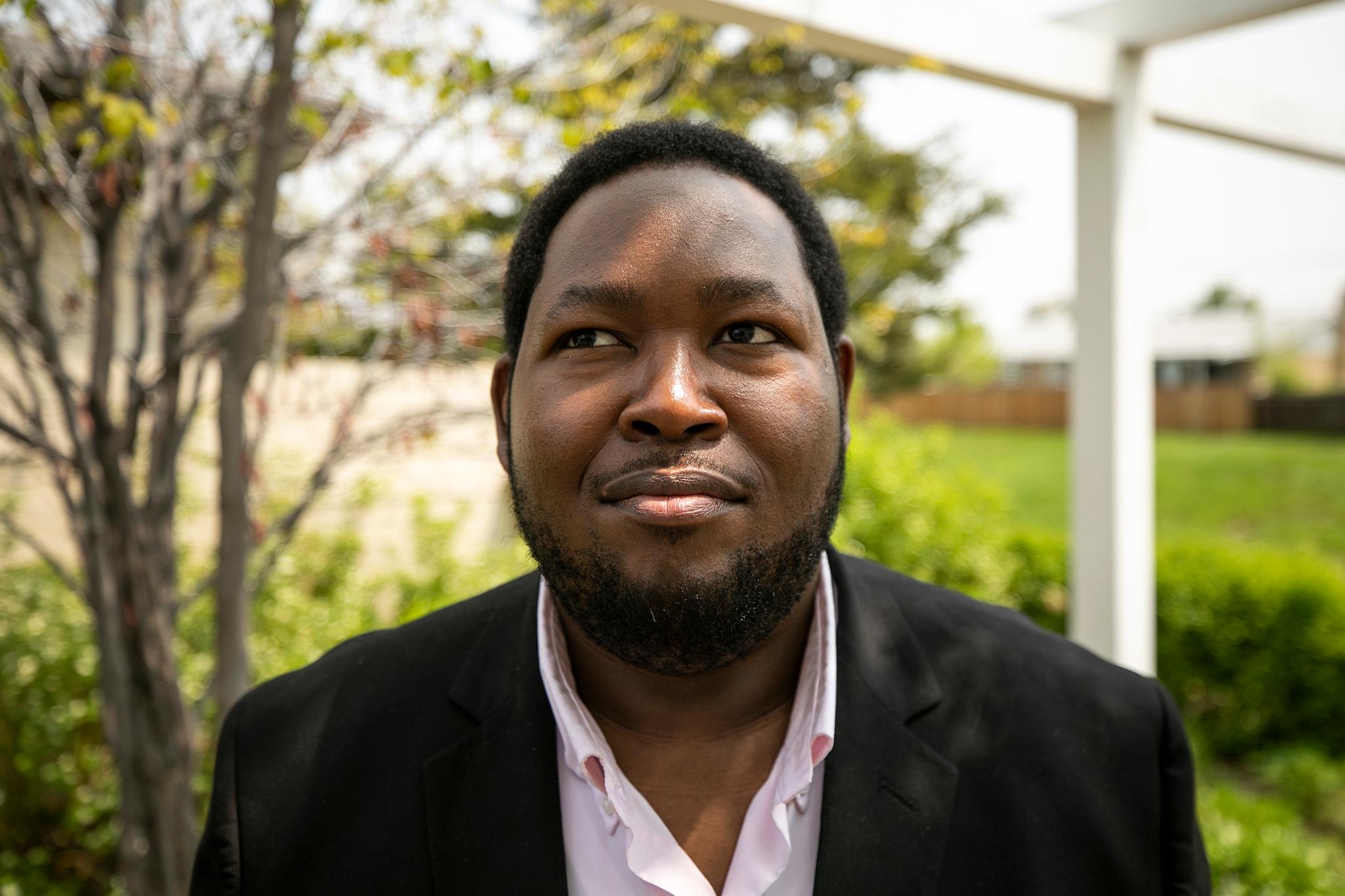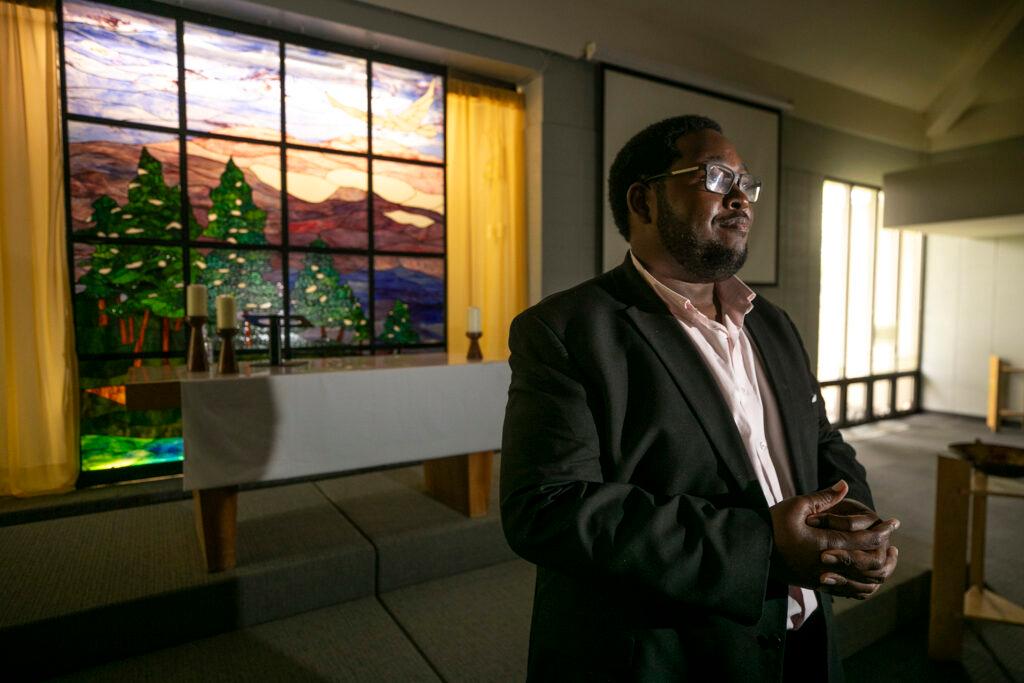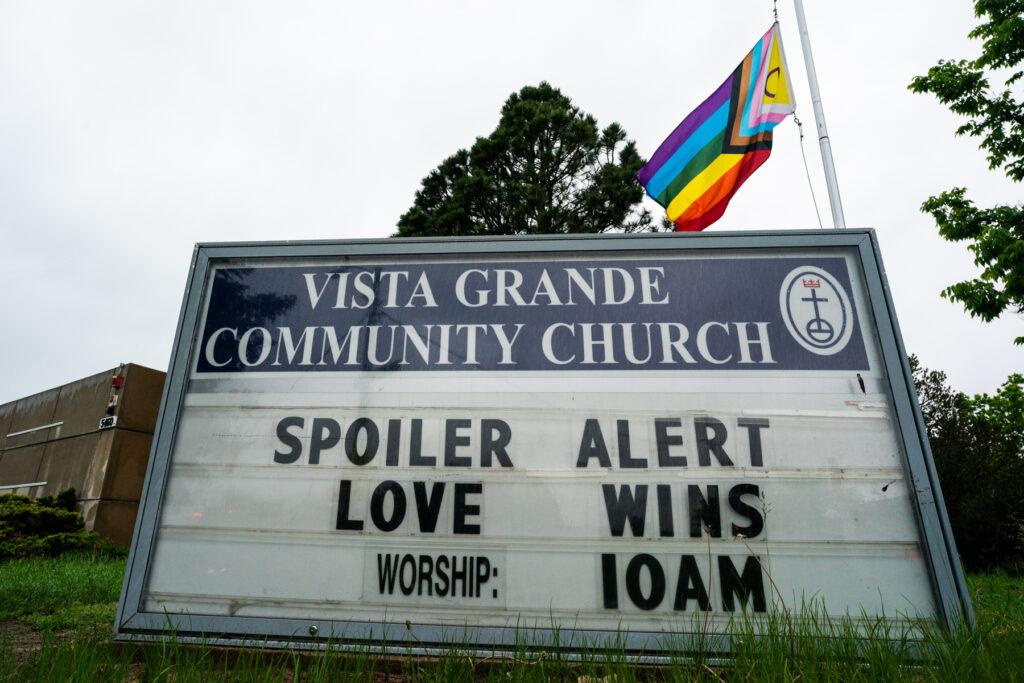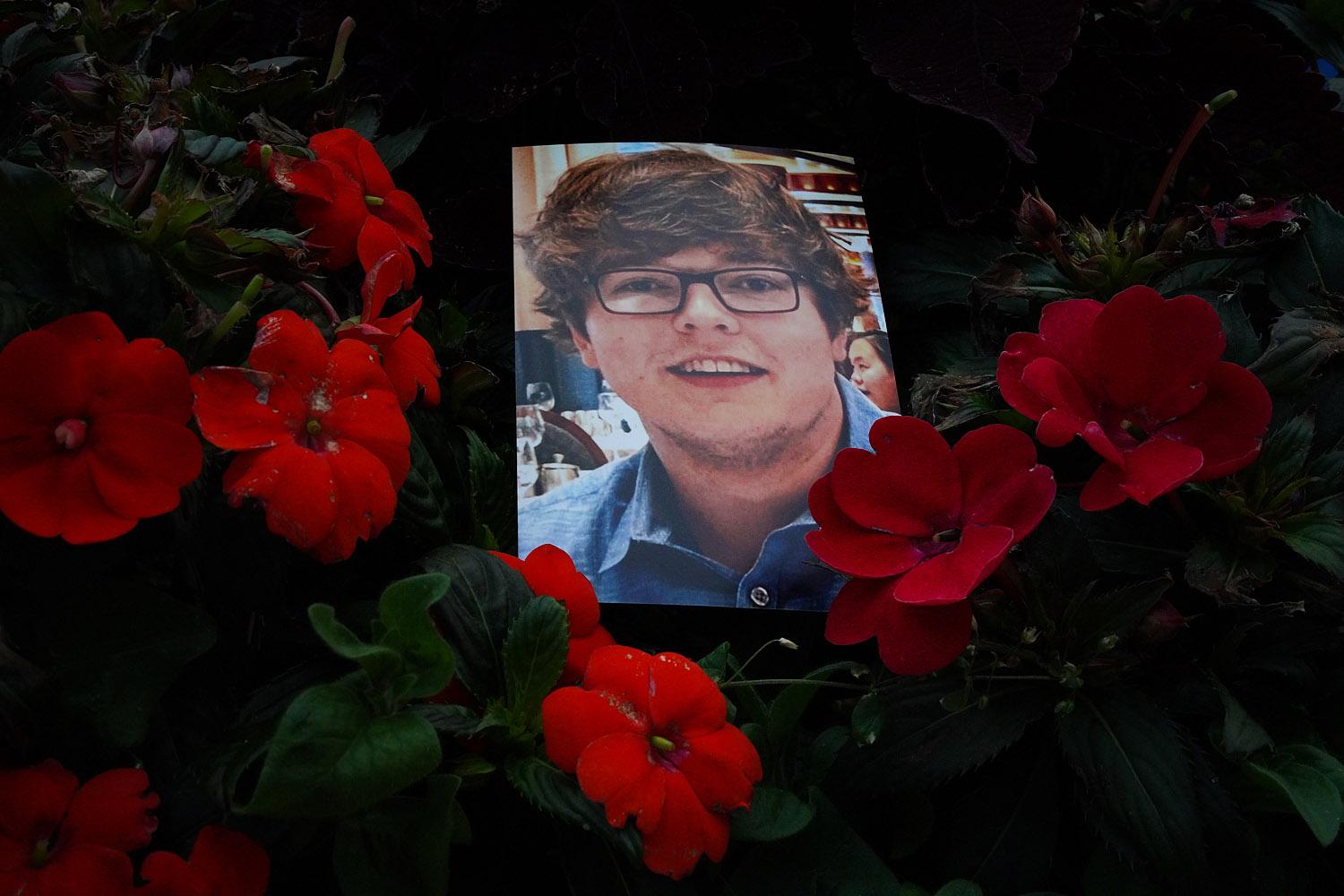
Rev. Anthony Scott comes from a long line of ministers. Both sides of his family have been involved in the church for at least five generations. So when he felt the call to serve at age 16, it felt predestined.
From the start of seminary school, his faith work has been intertwined with social justice and the Black Lives Matter movements, first in Philadelphia and then in St. Louis. That too, seemed unavoidable.
“I felt like I could not not do the work because I had skin in the game, literally my skin,” said Scott, who is Black.
After Scott and his wife moved to Colorado, he worked with a couple of local churches before accepting a job as the diversity and inclusion leader for the Rocky Mountain Conference of the United Church of Christ.
It was summer 2020, the height of the pandemic and George Floyd had just been killed in Minneapolis. As racial justice protests took place around the country, many organizations, both within the church and outside of it, decided they urgently needed to evaluate their own internal structures.
Diversity, equity and inclusion, or DEI, roles increased by 55 percent in 2020, according to data from the Society for Human Resources. Now three years later, that initial momentum has faltered and many of those roles have been eliminated.
As the calls for greater equity cooled, Scott found himself thrust in the middle of a conversation that would make him question the work he was hired to do and the commitment to equity of the organization that hired him to do it.
For Scott, the DEI role was a natural extension of his prior work, but it was also personal.
“If I did not participate in the work of anti-racism, in the work of education, in the work of trying to engender a cultural shift from one of racism to one of anti-racism — one that is flowing against the grain and the trajectory of white supremacy in this country, [then] I too, would be in danger,” he said.
The United Church of Christ denomination is largely made up of white people, according to the Pew Research Center. The Rocky Mountain Conference covers Colorado, Wyoming and Utah — states whose demographics also skew majority white, based on U.S. Census data.
“At first, there was a great sense of welcome and a great sense of celebration of me and of the work that I had been called to do,” Scott said.
Traveling between the three states, Scott built a strong network among congregations and church leaders. He developed new curricula and taught his colleagues how to make their churches more inclusive and equitable.
“[Scott] had a way of being within what could be a very hostile group. And he kept us engaged and he kept us communicating,” said Clare Twomey, who led Vista Grande Community Church in Colorado Springs before leaving last year. The church is part of the Rocky Mountain Conference where Scott was a DEI leader.
But even as those positive interactions increased, Scott said his relationship with his superiors and members of the Rocky Mountain Conference’s board of directors grew rocky.
“He struck me as somebody who was very careful not to offend and to really want to stay in this space, even though I imagine … that there were times where it became very painful because of our own ignorance and lack of sensitivity,” Twomey said. “And yet he adamantly stayed firm in his commitment to that work.”
Scott said a participant in a Zoom meeting once apologized for how dark the room’s lighting was but said at least it’s “not as dark as you.” When he told his white female supervisor about the incident, he said she commended him for standing up for himself and changed the subject of the conversation.
Scott wasn’t alone. He said he heard from other Black clergy members within the conference and in Colorado who experienced similar issues.
An ‘abrupt’ firing
In August 2022, Scott said his relationship with his supervisor turned sour. According to Scott, his supervisor began yelling at him for being late to a meeting, and told him he was unfit for his job and was underperforming in his work.
“I knew that that wasn't true because I had never had a negative performance evaluation,” Scott said. He maintains he was on time for the meeting.
After the incident, Scott filed a report with the conference and he requested an apology.
But in November 2022, a meeting with his boss’s supervisor was scheduled where he was fired.
“There was no forewarning, there was no performance review process initiated. It was just a swift, abrupt, ‘We're terminating you today,’” Scott said. “They offered an agreement of separation, which contained a severance amount. But that was contingent on a non-disclosure agreement.”
He didn’t sign: “I could not, in good conscience, accept that.”

CPR News contacted The Rocky Mountain Conference of the United Church of Christ about these allegations. Interim Conference Minister for the conference Rev. Douglas Wooten said in an emailed statement, “We do not take these matters lightly. We are concerned about legal ramifications but, as a community of faith, our overriding concern is for healing and for allowing justice and equity to prevail.”
“In the case of Rev. Dr. Scott, remedies have been and are being offered in hopes of finding a path toward wholeness, both for Dr. Scott and for the Conference,” the statement continued.
Scott has since filed a charge of discrimination with the Colorado Division of Civil Rights and an investigation is underway.
The Rocky Mountain Conference responded to CPR News’ request for comment, but did not address specific questions CPR News asked about Scott’s relationship with his supervisor or his firing.
“Any time we hear about cases involving racial discrimination, we become concerned. We take such matters very seriously,” said Charles Jefferson, director of Marketing and Communications for the United Church of Christ nationally. “We are a church that has shown itself to be both capable of great harm to people of color and capable of being a critical agent of racial equity. We repent of the former and seek with passion and intent to increase the latter.”
He added that the United Church of Christ’s rules prohibit national church leaders from interfering with local church issues.
“Speaking on this or any disciplinary matter involving employees in another setting of the church, would be a violation of our polity and ethics,” Jefferson said.
In June, the Rocky Mountain Conference of the United Church of Christ held its annual meeting, during which members discussed a resolution for Scott. According to a document Scott shared with CPR News that church leaders confirmed was accurate, representatives laid out two proposed resolutions: They recommended that Scott be offered his old job with “full back pay and benefits." But if he declined to be reinstated, he would receive “back pay and benefits from the date of his termination to present.”
Whichever option Scott chose, he would receive an apology and pay in the amount of $68,000 by July 1, 2023, according to the amended version of the document that CPR News obtained from the church. At the time of publication of this story, he had yet to receive anything from the conference.
According to Rev. Wooten with the Rocky Mountain Conference, these were not the terms a majority of conference members agreed on and the conference’s board has yet to complete a resolution on the matter.
“The Board is working diligently to act as quickly as possible to satisfy all parties involved,” Wooten said in mid-July.
A rapid rise, then precipitous decline in DEI jobs
Scott’s experience is far from uncommon for people hired into DEI roles in 2020. Many people who took on DEI work are no longer in those roles three years later, NBC News reported.
Since the summer of 2022, the number of layoffs for DEI roles has outpaced layoffs in other jobs in the U.S. More than 300 DEI professionals, mainly in the tech industry, have quit their positions in the same time period, according to data from Revelio Labs that it produced in collaboration with The Washington Post and Reuters. DEI roles also had more employee turnover than in other jobs across all American companies, the data shows.
In the nonprofit world, including religious or faith-based organizations, there is a sense of fatigue when it comes to DEI, said Yolanda Johnson, president and founder of YFJ Consulting, which provides expertise in fundraising, inclusion, equity and diversity to nonprofit organizations.
“What people have to understand is that this work is a lifestyle change. It's work of the heart, and it changes at the rate of people,” Johnson said.
Many organizations took pledges, made statements and even created task forces or committees dedicated to anti-racism and social justice work in 2020. But today, those efforts have faded. The initiatives were great, Johnson said, but the lack of accountability didn’t foster sustained change.
Rev. Dr. Nancy Niero agreed. Ordained in the Rocky Mountain Conference, she recently completed a Ph.D. where she researched white silence in the conference. She found the culture within the church gives preference to whiteness and is resistant to change.
“It appears that clergy were more protective of maintaining systems, rather than dismantling systems to make [a church constructed for the] 21st Century,” Niero said. “Based on what I am hearing from a lot of other clergy colleagues around the country, this is not an isolated situation of white churches not wanting to do the work of dismantling white silence or decentering whiteness in sanctuaries.”

Twomey, the former reverend at Vista Grande Community Church in Colorado Springs, encountered this resistance in her own work.
A frequent participant in social justice rallies, Twomey joined a racial justice task force for the conference in 2020. She said her congregation was committed to learning about how to be anti-racist and wanted to do the work to dismantle white supremacy. Working with Scott and others, the task force developed guidelines for how to make the conference more diverse and requirements that clergy members would need to follow.
However, Twomey said pushback from conference leadership was “tremendous,” and they didn’t see a need to prioritize diversity, equity and inclusion work.
“Across the board, progressive churches can be highly problematic because we think that if we think the right way, we can't be held accountable to our complicity in any -ism,” Twomey said.
Niero questions whether people of color are supported within the conference. She noted that at the United Church of Christ’s annual meeting earlier this summer, no Black clergy were sent to represent the Rocky Mountain Conference.
“Are we doing everything to create safe spaces for Black people who are congregants? Are we lifting up the one Black church we have in our conference?” Niero asked, referring to the United Church of Montbello. “I hear pastors or lay leaders say, ‘Whoever you are, you are welcome here.’ And I say to that, ‘Show me; Show me how people of color are welcome here.’”
‘Staying the course’
By summer 2022, Twomey resigned from her post with Vista Grande Community Church after her partner accepted a job in Pennsylvania. Once there, she decided not to work with a church, instead taking a job with the state’s Human Relations Commission.
“I did not seek another church because I did not feel welcome in the larger church anymore,” she said. She added that she was not pushed out of Vista Grande, but in terms of the conference, “it was very clear that what I was bringing to the table with regard to my call and this work was not welcome.”
Months after Scott was terminated from his role, he moved back East. He now leads Reformation Lutheran Church, a historically Black congregation, in Philadelphia. After telling his new congregation leaders about what happened in the Rocky Mountain Conference of the United Church of Christ, he said they were understanding. They also asked him if he would lead DEI work within their organization.
“There are definitely some reservations I have,” Scott said. Before taking on another DEI-focused role, “I definitely want to do perhaps a more thorough job of assessing the environment or the atmosphere.”
If congregations want to make progress, people like Scott, who were hired into leadership positions, need to stay in those roles, said Johnson, the diversity consultant. And they need to be listened to by higher-ups so the congregations can evolve.
It’s not as easy as watching a video and coming up with a list of recommendations, Johnson said. Her theory on DEI is to put inclusion at the forefront because, without it, every other effort fails. That means looking beyond race and ethnicity and into other forms of diversity like gender, ability, age and more.
“Within the faith communities, I think it's just a matter of staying the course,” Johnson said, adding that she has seen some progress. “From theology, small group bible studies, fellowship activities, honoring and recognizing different cultural heritage months, learning about each other, sparking dialogue. I've seen leadership evolve and change and become more diverse. I've seen people change.”
The critical need for fact-centered reporting and thoughtful conversation has never been greater. If you can support us, we need you. Every gift of any amount sustains the in-depth reporting you depend on. We can't do it with you. Thank you.









